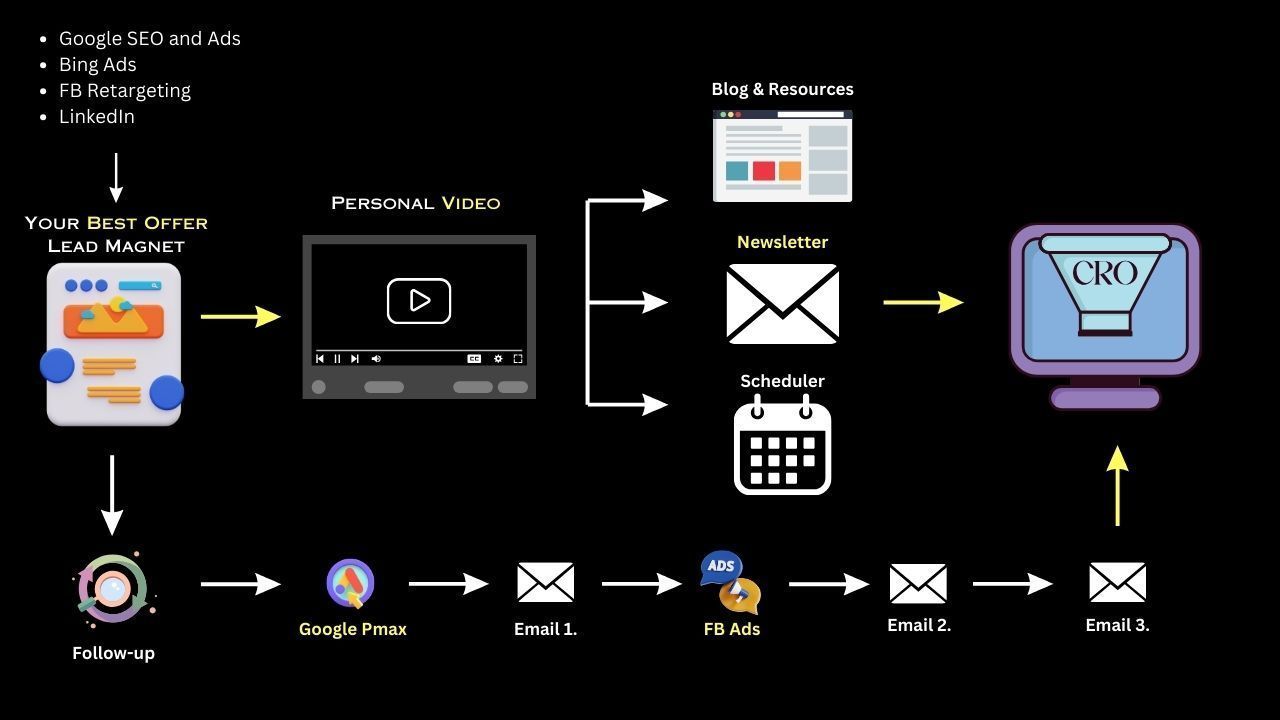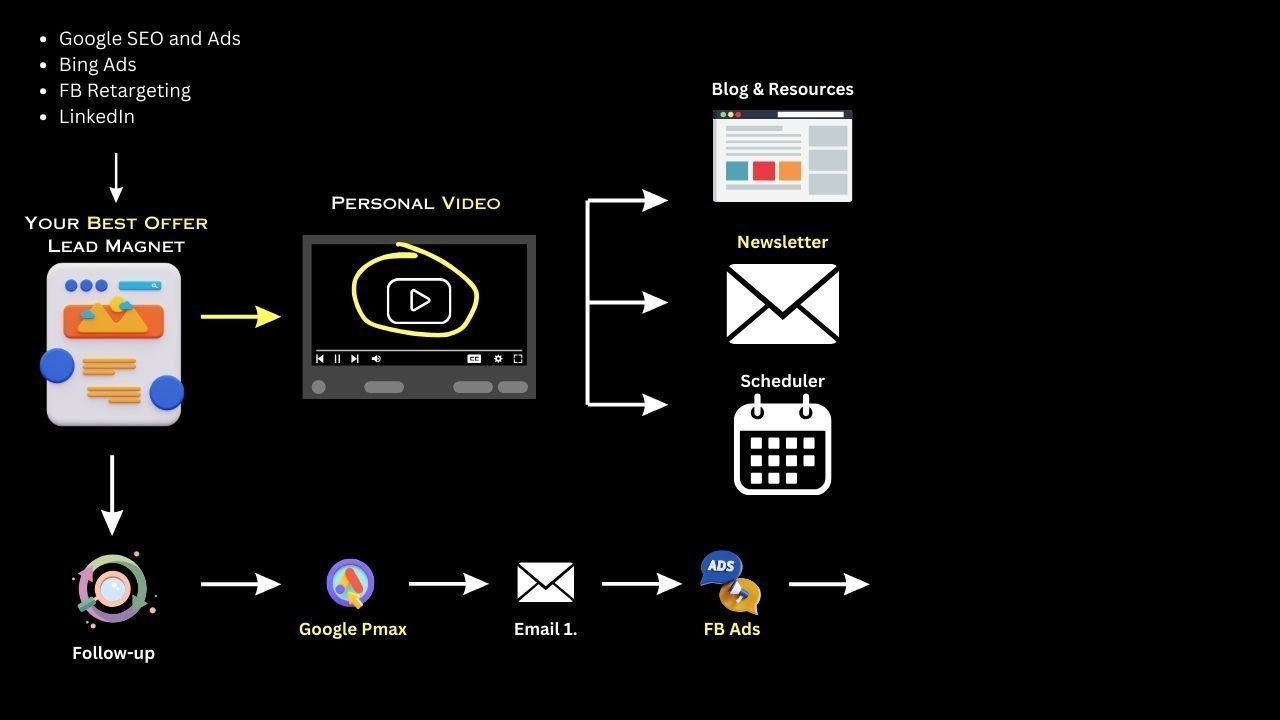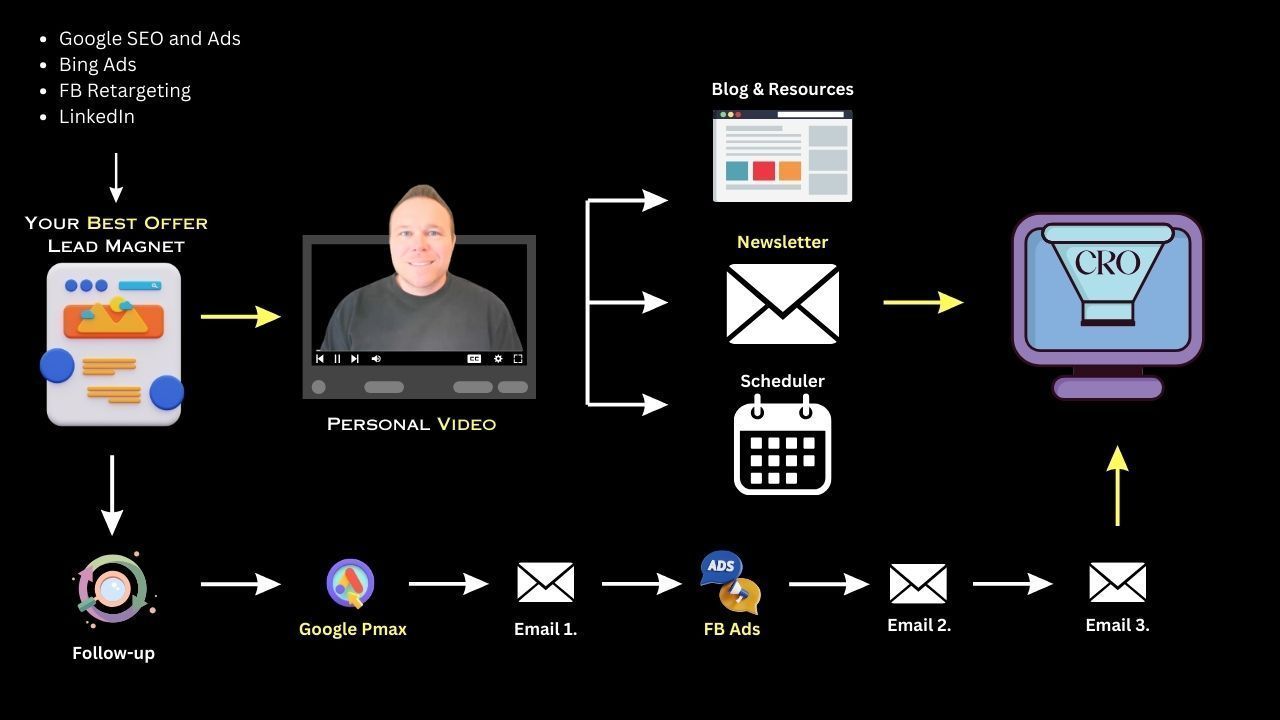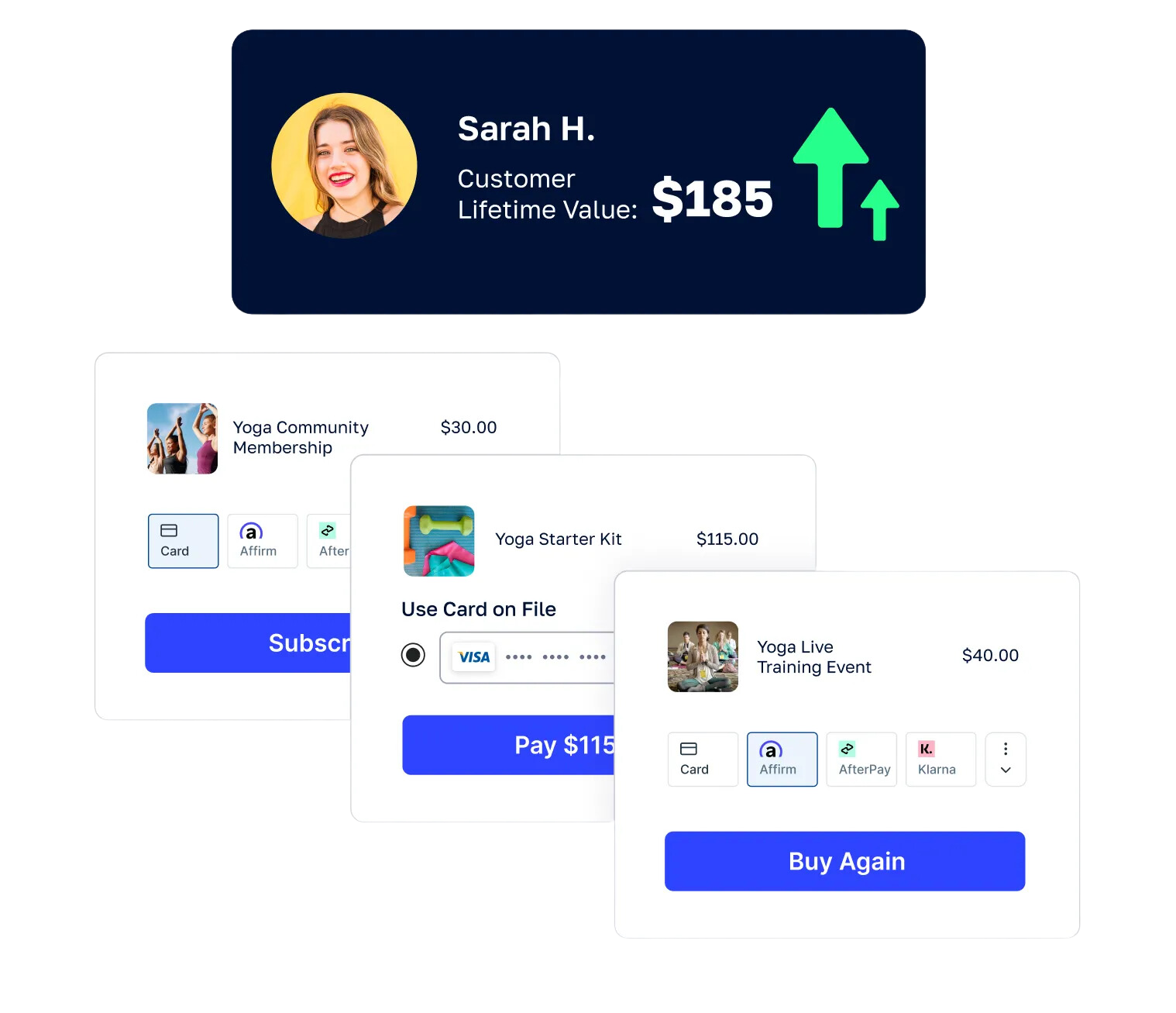AutomationLinks
This blog post has been researched, edited, and approved by expert Hannah Peake. Join our newsletter below to get our free marketing guides.
Here are four simple marketing tips for lawyers and attorney's:
- Focus on Local SEO: Ensure your law firm is visible in local search results by optimizing for local keywords, claiming your Google My Business listing, and encouraging satisfied clients to leave positive reviews.
- Create High-Quality, Educational Content: Establish your authority and expertise by regularly publishing informative blog posts, articles, and guides that address common legal questions and concerns of your target audience.
- Maintain Consistency Across All Digital Platforms: Build trust and recognition by ensuring your brand's messaging, visual identity, and tone are consistent across your website, social media, and all marketing materials.
- Engage Actively on Social Media:
Use social media platforms to connect with your audience, share valuable content, and humanize your brand. Regular interaction and responsiveness to comments and messages can significantly enhance client relationships.
Table of contents
- Introduction: The Importance of Digital Presence
- Understanding Your Target Audience
- Developing a Strong Brand Identity
- Leveraging Content Marketing
- Enhancing Online Visibility Through SEO
- Utilizing Social Media and Reviews
- Conclusion: Integrating Strategies for Success
The Importance of Digital Presence
In an era where the first consultation happens via a search engine, not having a robust digital presence is akin to being invisible in the legal industry. The shift from traditional marketing to digital arenas has transformed how attorneys and law firms are discovered and evaluated by potential clients. With the vast majority of your potential clients turning to the internet to find legal assistance, establishing a solid digital footprint is not just advantageous—it's imperative.
The digital landscape offers a plethora of opportunities for lawyers and attorneys to showcase their expertise, connect with clients, and build their brand. However, with every law firm vying for attention online, standing out in a crowded digital space requires more than just a website and a LinkedIn profile. It demands a well-thought-out marketing strategy tailored to the unique needs of the legal sector, leveraging the right mix of SEO, content marketing, social media, and other digital marketing tactics.
Creating a comprehensive digital marketing strategy enables law firms to reach their target audience more effectively, build trust with potential clients, and establish themselves as authoritative voices in their areas of specialization. Whether it's through informative blog posts, engaging social media content, or client testimonials, every piece of your digital presence should work together seamlessly to convey your firm's values, expertise, and commitment to client success.
Connect With Us On X
Connect with AutomationLinks owner Brad Smith on X (formerly Twitter) here to learn more about advertising. Feel free to message him with any questions about X advertising and marketing.
Understanding Your Target Audience
Identifying and understanding your target audience is the cornerstone of any successful marketing strategy, especially in the competitive legal industry. Knowing who your potential clients are, their demographics, legal needs, and how they seek legal assistance is crucial for crafting messages that resonate and convert. This involves diving deep into the specifics of your ideal client—age, gender, location, income level, and most importantly, their legal challenges and objectives. By gathering and analyzing this information, lawyers and attorneys can create a more targeted approach in their marketing efforts, ensuring they reach the right people at the right time.
Once you have a clear picture of your target audience, tailoring your marketing messages to meet their specific needs becomes much easier. This personalization can significantly increase the effectiveness of your communication, making potential clients feel understood and supported even before they've contacted your firm. Tailoring your message is not just about addressing the legal issue at hand but also about conveying empathy, reliability, and the unique value your practice offers. It's about creating a connection that goes beyond legal advice, positioning your firm as the go-to source for legal assistance.
- Conduct Audience Research: Use surveys, interviews, and social media engagement to gather insights about your target audience's preferences and pain points.
- Create Personas: Develop detailed personas for your ideal clients. This helps in visualizing the audience and making your messages more personal and relevant.
- Analyze Competitors: Look at how your competitors are addressing the needs of similar audiences and identify gaps that you can fill.
- Utilize Data Analytics: Leverage analytics tools to monitor the behavior of visitors to your website and social media platforms, gaining a better understanding of what resonates with your audience.
- Feedback Loops: Encourage and analyze feedback from current and past clients to continuously refine your understanding of your audience’s needs.
Developing a Strong Brand Identity
Establishing a strong brand identity is critical for law firms aiming to differentiate themselves in a crowded market. Your brand identity is the embodiment of your firm's values, professionalism, and the unique approach you bring to the legal field. It's what sets you apart from competitors and resonates with your target audience, making it essential for building a memorable and trustworthy presence. A well-defined brand identity communicates not just what services you offer, but who you are, what you stand for, and why clients should choose you over others. This encompasses everything from your logo and visual aesthetics to your tone of voice and the content you produce. By clearly defining and expressing your brand values and image, you can attract clients who share your values and are looking for the specific expertise you provide.
Maintaining consistency across all marketing platforms is a key aspect of developing a strong brand identity. Consistency ensures that your brand is easily recognizable, whether a potential client encounters you on social media, your website, or through online advertisements. This uniformity in messaging, visual elements, and overall experience builds familiarity, which is the foundation of trust. Trust, in turn, is essential for attracting and retaining clients in the legal sector, where the stakes are often high. To achieve this consistency, it's important to have clear brand guidelines that cover all aspects of your marketing and communication efforts, from the color scheme and typography of your visuals to the tone and style of your written content.
- Define Your Core Values: Clearly articulate what your firm stands for. These values should be evident in every aspect of your brand, from your marketing materials to the way you interact with clients.
- Invest in Professional Design: Your logo, website, and promotional materials should reflect professionalism and quality. Consider hiring a professional designer to ensure your brand's visual identity aligns with your values and appeals to your target audience.
- Be Consistent Across Channels: Ensure that your brand's visual and verbal identity is consistent across all platforms, including your website, social media profiles, email campaigns, and printed materials.
- Communicate Your Unique Selling Proposition (USP): Clearly convey what makes your firm unique and why potential clients should choose you over competitors. This should be a key component of your brand messaging.
- Monitor and Adapt: Regularly review your brand's performance across various platforms. Be open to refining your brand identity based on feedback and changes in your target audience's preferences or the legal market.
Leveraging Content Marketing
Content marketing is a powerful tool for lawyers and attorneys to establish authority, demonstrate expertise, and engage with potential clients in a meaningful way. By creating and sharing high-quality, educational content such as blogs, articles, and guides, law firms can address the common questions and concerns of their target audience while showcasing their knowledge and experience in the legal field. This not only helps in building trust with potential clients but also enhances your firm's online visibility, making it easier for people to find you through search engines. Educational content serves as a platform to elucidate complex legal concepts, offer insights into recent legal changes, and provide practical advice, thereby positioning your firm as a trusted resource in the legal community.
Engagement strategies are crucial for turning passive readers into active clients. Valuable content that resonates with your audience is the first step, but encouraging interaction and further engagement is what ultimately leads to conversion. This can be achieved by including clear calls-to-action (CTAs) within your content, inviting readers to contact your firm for more personalized advice or to schedule a consultation. Utilizing social media to share your content and engage in conversations, hosting webinars, and offering free initial consultations are other effective strategies. By actively engaging with your audience, responding to comments, and participating in relevant online forums, you can further establish your firm's presence and credibility.
- Identify Key Topics: Focus on topics that are relevant to your target audience's needs and interests. Use keyword research to find what potential clients are searching for online.
- Quality Over Quantity: Prioritize creating high-quality, informative content that provides real value to your readers over publishing content frequently with little substance.
- Diversify Your Content: Include a mix of content types, such as blog posts, infographics, videos, and podcasts, to cater to different preferences and increase engagement.
- Optimize for SEO: Ensure your content is optimized for search engines by incorporating relevant keywords, meta descriptions, and headers. This improves visibility and drives organic traffic to your site.
- Measure and Adapt: Use analytics to track the performance of your content marketing efforts. Analyze what works best and adjust your strategy accordingly to maximize engagement and conversion rates.
Enhancing Online Visibility Through SEO
In the competitive legal industry, enhancing your online visibility through search engine optimization (SEO) is critical to ensuring potential clients can find your services. SEO for lawyers involves a tailored approach that focuses on keywords, local SEO, and optimizing your online presence to rank higher in search engine results. Keywords are the foundation of SEO; identifying and incorporating the right keywords into your website content, blog posts, and metadata allows you to connect with users searching for legal assistance. Local SEO is particularly important for lawyers and attorneys, as many clients are looking for legal services within their geographical area. This means optimizing your website for local search terms, claiming your Google My Business listing, and ensuring your practice is listed in local directories.
Website optimization plays a crucial role in SEO and overall user experience. A website that loads quickly, is easy to navigate, and is mobile-responsive not only ranks better on search engines but also provides a positive experience for visitors. This increases the likelihood of converting these visitors into clients. Ensuring your website is accessible and user-friendly across all devices is essential in today's mobile-first world. Additionally, optimizing your website's structure, improving load times, and providing clear, easy-to-find contact information can significantly impact your SEO efforts and client acquisition rates.
- Conduct Comprehensive Keyword Research: Use tools like Google Keyword Planner to find relevant keywords that potential clients are using to search for legal services in your specialty and area.
- Optimize for Local SEO: Claim your Google My Business listing, ensure your practice's name, address, and phone number (NAP) are consistent across the web, and encourage satisfied clients to leave positive reviews.
- Improve Website Speed: Use tools like Google PageSpeed Insights to identify and fix issues that slow down your website, as speed is a ranking factor for Google.
- Make Your Website Mobile-Friendly: Ensure your website design is responsive and provides a seamless experience on mobile devices, as mobile usability is crucial for ranking and user experience.
- Publish Quality Content Regularly: Create and share informative and engaging content that incorporates your target keywords naturally, addressing the questions and concerns of your potential clients.
Utilizing Social Media and Reviews
Social media has become an indispensable tool for law firms aiming to expand their reach, connect with potential clients, and humanize their brand. Platforms like LinkedIn, Twitter, Facebook, and Instagram offer unique opportunities to share valuable content, engage in conversations, and showcase the more relatable aspects of your practice. Through consistent social media engagement, law firms can strengthen relationships with their audience, increase their visibility, and establish themselves as approachable and knowledgeable in their field. Sharing insights on legal developments, offering tips, and highlighting your firm's achievements and community involvement are great ways to provide value and foster trust with your followers. Additionally, social media allows for direct interaction with your audience, enabling you to answer questions, participate in discussions, and receive immediate feedback, further enhancing your brand's presence and credibility.
Managing online reviews is another critical aspect of building a strong online presence and attracting more clients. Positive reviews can significantly boost your firm's credibility, while negative reviews offer an opportunity to demonstrate your commitment to client satisfaction. It's important to actively encourage satisfied clients to leave reviews on platforms like Google, Yelp, and Avvo. Monitoring these reviews regularly allows you to respond promptly, thanking clients for positive feedback and addressing any concerns raised in negative reviews professionally and constructively. This proactive approach to online reputation management can turn potential negatives into positives by showing prospective clients that you value feedback and are dedicated to continuous improvement.
- Develop a Content Calendar: Plan your social media content in advance to ensure a consistent posting schedule, covering a variety of topics relevant to your audience.
- Engage Regularly: Make it a habit to respond to comments, messages, and mentions promptly, showing your audience that you value their engagement.
- Showcase Your Expertise: Share articles, blog posts, and case studies that demonstrate your knowledge and experience in the legal field.
- Encourage Reviews: Ask satisfied clients to share their experiences by leaving reviews online, and make it easy for them by providing links to your profiles on review sites.
- Address Negative Reviews Diplomatically: Respond to negative feedback with professionalism and a willingness to resolve any issues, demonstrating your firm's commitment to client satisfaction.
- Leverage User-Generated Content: Share stories, testimonials, and endorsements from your clients (with their permission), adding authenticity to your social media presence.
Integrating Strategies for Success

Throughout this guide, we've explored the essential components of a successful marketing strategy for lawyers and attorneys, emphasizing the importance of digital presence in today's competitive landscape. From understanding your target audience and developing a strong brand identity to leveraging content marketing, enhancing online visibility through SEO, and utilizing social media and reviews, each strategy plays a vital role in building a comprehensive and effective marketing approach. By focusing on these key areas, law firms can establish a strong online presence, connect with potential clients on a deeper level, and stand out in a crowded digital space.
The integration of these strategies is crucial for achieving long-term success. A well-thought-out marketing plan that combines SEO, content marketing, social media engagement, and reputation management can significantly increase your firm's visibility and attractiveness to potential clients. It's not just about being found online; it's about creating a compelling, trustworthy presence that resonates with your audience and encourages them to choose your firm over others.
Take the First Step Towards Enhancing Your Marketing Strategy
Now is the time to take action. Evaluate your current marketing efforts, identify areas for improvement, and begin integrating these strategies into your marketing plan. Whether it's by revamping your website for better SEO, creating valuable content that showcases your expertise, or engaging more actively with your audience on social media, every step you take will bring you closer to achieving your marketing goals.
AutomationLinks
AutomationLinks is a digital marketing agency located in Wilmington North Carolina. We have worked with over 6,000 businesses and nonprofits over the last 10 years. We believe in a relationship marketing approach to help you turn visitors into customers using automation.





















